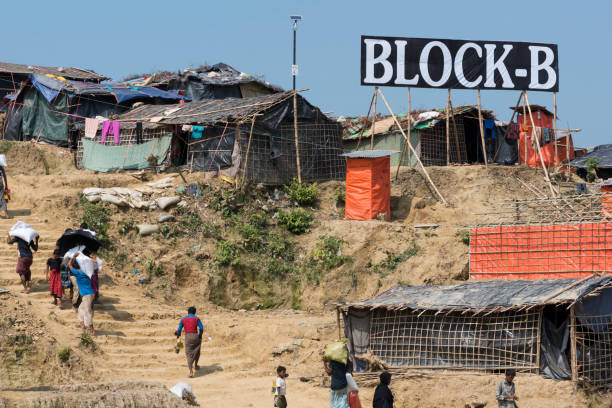Ramadan In Ronhingya Refugee Camps

By Shere Hussain, Sona Circle
The Holy month of Ramadan occurs on the ninth month of the Muslim calendar.
Muslims believe it was during this month that God revealed the first verses of the Quran, the central religious text, to prophet Muhammad, on the evening known as The Night of Power (or referred to as Laylat al-Qadr in Arabic).
During the month of Ramadan, Muslims partake in fasting from dawn to dusk. This includes refraining from eating, drinking, smoking and sinful behaviour.
It is a time to get closer to God and a way to show compassion to those less fortunate by gaining a better understanding of human suffering. Acts of volunteering and charitable giving are encouraged in the holy month.
Although Ramadan is meant to be a blissful month to seek spiritual rewards – for Muslims who have been displaced due to conflict, persecution or climate change, it can be a difficult period of physical and emotional adversities.
According to UNHCR, there were 79.5 million forcibly displaced people at the end of 2019. Of those, 45.7million are displaced within their own countries and the rest have sought refuge in another country.
Although it is difficult to find the exact number of Muslims living in refugee camps, further reports from the UNHCR show that 67% per cent of displaced people come from just 5 countries, Syria, Afghanistan, South Sudan, Myanmar and Somalia, some of which are Muslim majority countries.
The difficulties faced in camps
More than 600,000 Rohingya refugees living in one of the worlds largest refugee camps in the Cox’s Bazaar District of Bangladesh will be observing Ramadan this month.
Although they are grateful for being able to fast, pray and study the Quran without the fear of reprisal and persecution from Myanmar’s government, who chased the Muslim minority Rohingya out of the Rakhine State in 2017, partaking in Ramadan will have its difficulties.
A fire occurred in the camp on the 22nd March 2021 due to a gas cylinder that quickly spread around the camp due to the winds. Around 50,000 have been displaced, over half of whom are children, over 10,000 shelters have been destroyed, around 400 people are still unaccounted for and 11 people have lost their lives.
Muslim Hands, a charity that is working around the Rohingya camps preparing to distribute Iftar to those in the camps have outlined the urgent support and donations they need to supply the food. Not only have the Rohingya residents watched their food supplies go up in flames, but at least two nutrition centres and one food distribution point have been destroyed, ‘’stretching resources even thinner’’.
UNICEF, who have been providing water and sanitation in Rohingya camps have outlined the difficulties the Muslims face during Ramadan since they occupied the camps 3 years ago.
Finding food for the evening and early morning meals have been described as ‘’challenging’’. In addition, temperatures in the daytime reach the 90s, and with no electricity, power, a fan, or even shade (as many of the trees have been cut down to build shelter), abstaining from water is very difficult.
Many Rohingya refugees will also be observing a very lonely Ramadan. Over 18,500 Rohingya Muslims have been relocated to Bhasan Char, a remote island in the Bay of Bengal which has been criticised the by UN Refugee Agency over the site’s vulnerability to severe weather and flooding.
The relocating of refugees was authorised by the Bangladesh government due to the overcrowding in the Cox’s Bazar camp. However, refugees living in the camps, who have been separated from family, have described life on the remote camp as ‘’lonely’’ and are missing the community feel of the Cox’s Bazar camp, where family and friends celebrated Ramadan together.
We can all use the principles Ramadan teaches us
The difficulties the Rohingya refugees face during Ramadan are not new, and the hardships are encountered in many refugee camps, particularly in Africa, Asia and the Middle East.
Many refugees have limited access to food and water on a daily basis, and partaking in Ramadan shows how difficult it can be to go without food or water – let alone in an overpopulated camp in very hot conditions.
Whether you are Muslim or not, we can all adopt principles that are encouraged during Ramadan such as volunteering in the community and charitable giving to those less fortunate.